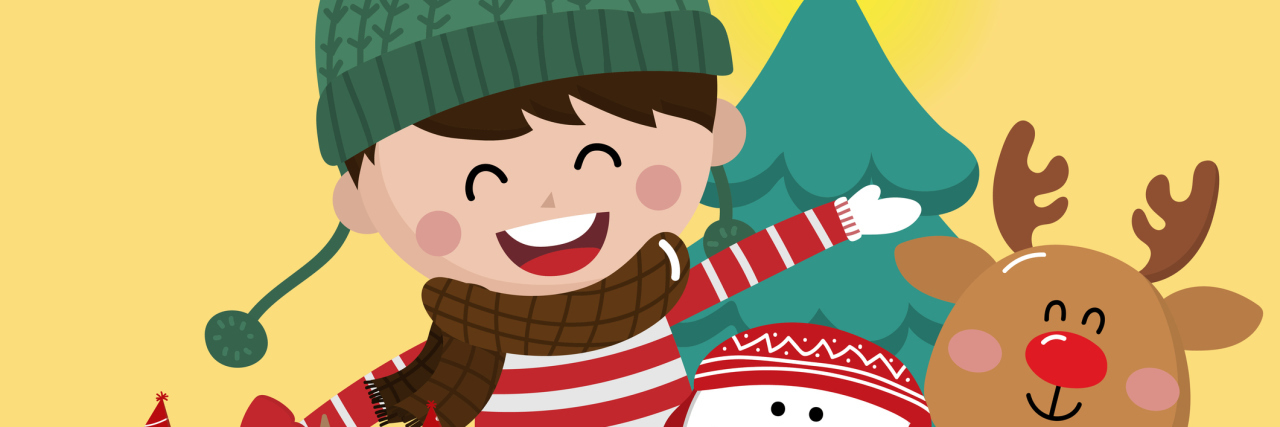As a child, I absolutely adored the candlelit church service at Christmas. We sand carols and heard the Christmas story from the Bible surrounded by the beautiful glow of Christmas lights.
Nowadays we don’t attend services like this. Kiddo’s sensory needs make those events challenging. So instead, here are nine things I have learned about hosting an autism friendly Christmas over the years:
1. Go with the flow.
You book tickets to see Santa, there’s the school nativity, you want to decorate your house. The sooner you accept the fact that your expectations may need to change, the sooner you will fall in love with Christmas all over again. It’s so important to recognize and respect what our children can’t handle at Christmas. The lack or routine, the sensory overload from all the lights and sparkle — it all contributes to a very difficult time for our autistic loved ones. They need you, after all, Christmas is about love and family.
2. Present buying.
This took me a couple of years to get my head round. Don’t be tempted by all the commercial hype around the latest toy. Think about what your child really enjoys. Last year I bought kiddo a beautiful wooden marble set. “He will definitely love this!” I thought. He played with it once. This year I watched really carefully and started to think outside the box. What are his true loves? Some examples of what he is getting include a pink donut cushion (with sprinkles on obviously), a tonne of surprise eggs and more Play-Doh. Yes, he has had similar presents before, but he loves them! This reduces the risk of a meltdown on Christmas if he is greeted with presents he is familiar and happy with.
3. Decorations.
This one was hard for me. In the past I went all out with the decorations. They were everywhere. But I soon realized they were the sole cause of kiddo refusing to leave his room. I had to dial it back. This year we have nailed it! Kiddo has decorated his own tree in one room, and he adores it. He takes things off and puts them back on as he sees fit. It’s so amazing to see him enjoy it so much. I also have my own room of decorations! Even if it’s your bedroom, make just one room Christmassy and then any autistic family members can choose to avoid that one room should they wish to do so. We have also put lots of decorations up outside our house for the world to see, where kiddo doesn’t feel overloaded by them. It’s led to a much happier household this time of the year.
4. A breakout space.
This is critical — and not just for Christmas day. Whether it’s a tent, a whole room or an allocated space in the house that is easily accessible, make sure autistic children (or adults) have a quiet space where they retreat and regulate. Have some sensory toys and a tablet in that space for children to “escape.” They’re not being rude or anti-social, they need that time. Don’t deny them the chance to press the reset button.
5. Visiting Santa.
I know from speaking to several people that this is one of the hardest aspects of Christmas. Autistic children can become overloaded in these settings. There are several things you can do here. First, check if there are any disability friendly sessions happening near you. If there aren’t, campaign for one! These things always start with one person, why can’t that be you? If you do attempt a regular visit, be sure to call ahead and explain your child’s needs. Maybe they don’t want to experience the whole thing? Maybe Santa is enough, or maybe the big man is just a no go. How can you adapt the visit for your child? And if you really can’t manage it, consider getting a friend to dress up as Santa and knock on your door. After all, doesn’t Santa visit every child at home on Christmas Eve?
6. Christmas dinner.
Chicken nuggets all round! Kiddo has the same food he always has. Last year we had a massive success when he wanted to join us all at the table! He had his headphones on and was well into his iPad, but who cares? My kid wanted to be included and this was the only way he could manage it. Don’t leave them out because of an expectation to conform to traditional table manners. They may want to sit with you if they have the freedom to be themselves and use the tools they have available to participate.
7. Friends and family.
If you can, offer to host Christmas. Your children have all their comforts and familiarity at home. You can create their safe space and no one will complain at having to cook chicken nuggets on Christmas day. Your house, your rules. If guests don’t like it, they can catch a ride with Rudolph.
8. School timetables.
This is a tough one. When the school timetable changes and there are festivities happening round the clock, many children love it! I certainly did. But it can be an autistic child’s nightmare. There’s no routine. Costumes are painful and itchy. There’s music in every corner. You’re soaked in stage lights as you try and get through a Christmas play or performance. If it’s not academic or necessary, question your child’s school regarding your chid’s involvement if they are struggling. You know your child best, speak up for them.
9. New traditions.
Come up with your own family traditions! Perhaps it’s making a gingerbread house out of Lego, or watching a certain Christmas film on repeat. The point is, Christmas can be whatever you make it. So make it yours.
Getty image by Dusida

